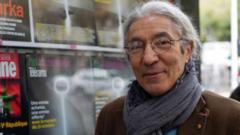Boualem Sansal, an 80-year-old writer of Algerian descent, has been sentenced to five years in prison by an Algerian court, as a result of statements made about the territorial ownership of Morocco and Algeria during colonial times. The writer, who was arrested last November upon arriving in Algiers from Paris, claimed that France granted too much land to Algeria while neglecting Morocco, encompassing historical references to the disputed region of Western Sahara.
While in custody, Sansal has faced health issues, requiring hospitalization at times. His situation has eluded significant attention and sparked support from global figures, including Wole Soyinka, the Nigerian Nobel laureate, and French President Emmanuel Macron. Macron remarked on the arbitrary nature of Sansal's detention and the need for it to be resolved to restore trust between Algeria and France.
Sansal's case has unwittingly positioned him in the middle of a deteriorating diplomatic relationship between Paris and Algiers. A committee formed by his supporters has articulated that he is now a pawn in this complex dynamic. Notably, past grievances between the two nations have been exacerbated, particularly after France endorsed Morocco’s claims to Western Sahara, resulting in Algeria consulting its diplomatic ties.
In light of the court's decision, Sansal’s legal representative has reached out to Algerian President Abdelmadjid Tebboune, urging him to exercise compassion towards the aging writer. While Sansal known for criticisms of the Algerian ruling elite and anti-Islamist sentiments, he has received sharp critique from some circles who view him as an ally to the far-right.
Marine Le Pen, a prominent far-right leader in France, has vocally supported Sansal, dubbing him a "fighter for liberty." Despite varying opinions on his stances, Sansal continues to receive notable recognition for his literary contributions, including his acclaimed novel “2084,” a critique of religious extremism. His anticipated work, “Vivre,” is set for release in May, narrating a speculative tale of survival amid an apocalyptic Earth scenario.
Sansal’s predicament brings forth critical conversations about freedom of expression and the intricate geopolitics surrounding Algeria and France, showcasing the enduring consequences of colonial history in contemporary narratives.
While in custody, Sansal has faced health issues, requiring hospitalization at times. His situation has eluded significant attention and sparked support from global figures, including Wole Soyinka, the Nigerian Nobel laureate, and French President Emmanuel Macron. Macron remarked on the arbitrary nature of Sansal's detention and the need for it to be resolved to restore trust between Algeria and France.
Sansal's case has unwittingly positioned him in the middle of a deteriorating diplomatic relationship between Paris and Algiers. A committee formed by his supporters has articulated that he is now a pawn in this complex dynamic. Notably, past grievances between the two nations have been exacerbated, particularly after France endorsed Morocco’s claims to Western Sahara, resulting in Algeria consulting its diplomatic ties.
In light of the court's decision, Sansal’s legal representative has reached out to Algerian President Abdelmadjid Tebboune, urging him to exercise compassion towards the aging writer. While Sansal known for criticisms of the Algerian ruling elite and anti-Islamist sentiments, he has received sharp critique from some circles who view him as an ally to the far-right.
Marine Le Pen, a prominent far-right leader in France, has vocally supported Sansal, dubbing him a "fighter for liberty." Despite varying opinions on his stances, Sansal continues to receive notable recognition for his literary contributions, including his acclaimed novel “2084,” a critique of religious extremism. His anticipated work, “Vivre,” is set for release in May, narrating a speculative tale of survival amid an apocalyptic Earth scenario.
Sansal’s predicament brings forth critical conversations about freedom of expression and the intricate geopolitics surrounding Algeria and France, showcasing the enduring consequences of colonial history in contemporary narratives.




















